
21 Engaging Performance Review Examples (+ Templates)
[ad_1]
Performance review season can be a daunting period for both management and employees.
One-sided conversations, mixed messages and wordy documents leave both parties feeling like they have the same, stressful conversation each time.
But if you take the right approach, quarterly performance reviews are an awesome opportunity to reinforce solid habits, redirect poor traits and drive professional growth for your employees.
In this post, I’ll give you tips from my own experience as an HR manager to make the performance review process a lot more painless, plus performance review examples you can customize now.
Performance review examples and advice:
What is a performance review?
A performance review is a regulated assessment in which managers assess an employee’s work performance to identify their strengths and weaknesses, offer feedback and assist with goal setting.
The frequency and depth of the review process may vary by company based on company size and goals of the evaluations.
This quarterly performance review example has sections for both achievements and areas of improvement. It also has a section for core values, as this must be a key performance indicator at this company. Different companies will have different measuring sticks for success.
Q: Can I customize the performance review templates in this post?
A: Yes, you can! All the templates are easy to edit. Some templates are free, some are paid.
Click any template and you’ll be asked to sign up for free. You’ll enter our online editor. Edit the text, apply your brand colors, add pages, upload your logo and more. Share a link for free. Upgrade to our Plan for Professionals to download in PDF or PowerPoint format and access premium features and templates, such as real-time team collaboration and one-click branding.
Performance review examples and templates
To conduct an effective performance review, it’s important to deliver a positive and solution-focused message. This will be less discouraging to the employee.
This performance review example shows how you can offer constructive feedback, while also praising the employee’s efforts. The majority of the sections focus on the employees’ achievements and strengths.
Suggested areas of improvement is positioned in the middle, letting managers cushion criticism with praise.
This performance review example shows how managers can give constructive feedback to their employees by giving them clear direction on what things to keep doing and what actions to take in future.
While Felicia did not meet her goal, her manager acknowledges that the goal was set deliberately high and that 74 percent of the goal still has significant impact.
This employee review form also points to specific positive behavior, such as self-education, teamwork and a strong work ethic.
There are also specific recommendations for improvement, such as putting together a plan to get more press mentions and scaling her experiments.
Another way to do a performance review, or kick off the process, is to use a quadrant. Both the employee and manager can plot where they think the former falls on certain key values and build out discussion points from there.
You can change “get it done/get it right” in the employee review template below to “upholds core values/contributes to company culture” for example.
Self performance review examples
In a self performance review, employees assess themselves using the same rubric as their managers would and submit them to HR and/or their manager prior to their official review meeting.
The benefit of doing self-assessments have caused them to become a common part of the employee review throughout many companies.
Self assessments are an encouraging opportunity for employees to share their thoughts about their job, goals, desired responsibilities and aspects of either their role or environment that they may be struggling with.
Set employees up for success in the self assessment process by giving them a robust employee evaluation form with thoughtful questions.
Annual self evaluation employee review template
This first example is perfect for a thorough annual review. The targeted questions prompt the employee to reflect on their achievements and shortcomings, while also rating themselves on specific skill sets required for their job.
The above employee self-assessment example allows for multiple sign-offs, plus a section to list colleagues who can back up the employee’s statements.
Yearly performance self evaluation templates
A yearly performance self-evaluation isn’t just a great chance for employees to assess their past performance.
It’s also a way for employees to plan for their professional future as they can see where their strengths lie and what skills they need to build to move up in the company. An annual self-evaluation can also build an employee’s case for their compensation review.
This employee self-evaluation form is broken into sections that cover all these factors: about your job, achievements, goals and professional development.
This yearly performance self-evaluation template has space to expand on goals met and alignment with core values, as well as skills they’d like to build in the future: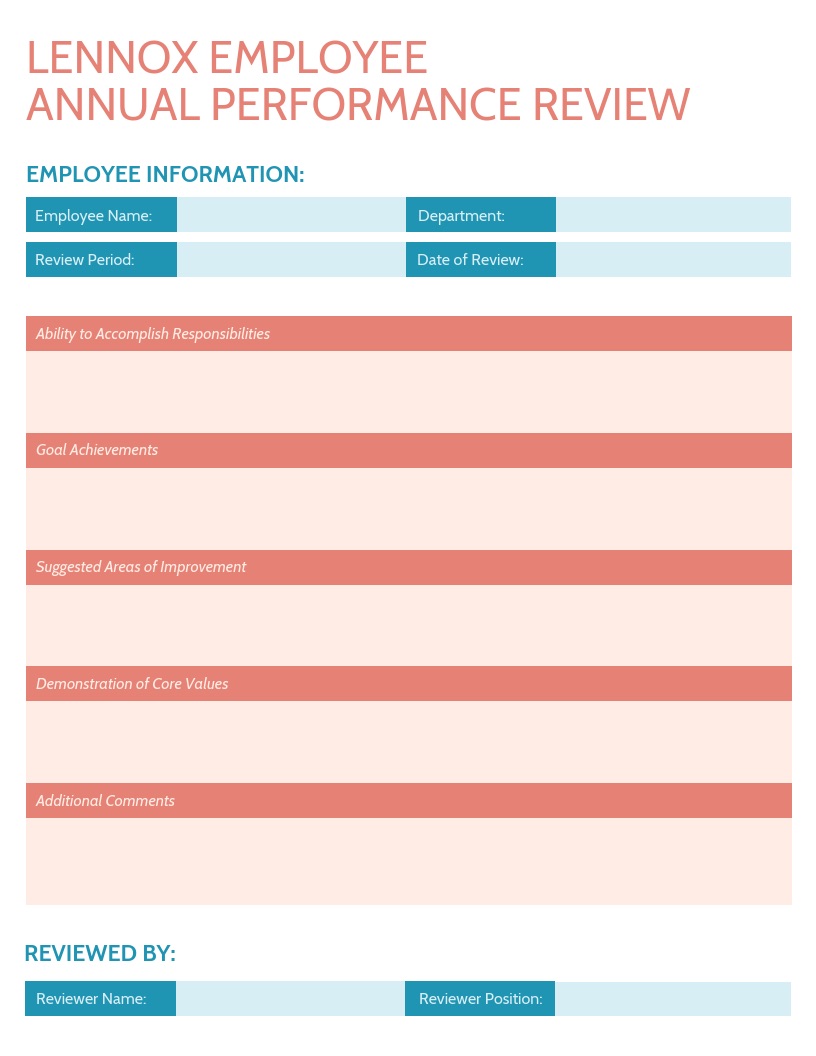
Self-assessment employee review forms
Many performance reviews are incredibly detailed. Sometimes, a higher-level overview is all that’s needed.
Quadrant evaluations, like the template below, are a great way for employees to do an assessment and for managers to quickly add their own evaluation, without getting into the weeds.
Employees can add what’s being evaluated in the easy-to-edit template below (instead of get it done/do it right). The employee adds an icon where they think they fall in the quadrant, and the manager does the same, with room on the last page to further break down the evaluation.
Sounds tough? Our real-time collaboration feature (part of the Business Plan) lets both manager and employee work on the same doc online, leave comments, share private links and more.
The self employee review form below lets the employee write out their job description. That way, they can reference their deliverables in the Goals Achieved and Areas of Excellence sections and directly demonstrate their impact on the organization:
How Do I Customize This Template? Click the template, sign up for free and enter the Venngage editor. Click any text box to change the words or the font. Choose from brand fonts (you can set this), template fonts or from our font library. There are plenty of modern options. This article on how to choose fonts can help you decide.
This self performance review example gives employees the chance to reflect on their achievements on a quarterly basis.
This way, employees can demonstrate meeting quarterly goals. It can also give them a chance to reflect on their strengths and weaknesses and have a chance to act on them before their big annual review:
How Do I Customize This Template? Click the template, sign up for free and enter the Venngage editor. Want to change the background colors? Click any section and then select a new color from the color picker tool. You can choose from a color from the color wheel, one of your brand colors (use My Brand Kit to set this up) or pre-set template colors. Or enter a HEX code if you want to get super specific.
Self-assessments also help enlighten managers of how employees understand their place within the company’s organization and culture.
The information disclosed in self-assessments should serve as a major element of official performance reviews in order to ensure that both a two-way conversation occurs and that the needs of both parties are being met moving forward.
To make for the most effective self-assessments, employees should be sure to consider how their managers’ perceptions of their performance varies from their own.
With this in mind, the information shared in a self-assessment can guide or pivot a manager’s perception and assessment of an employee’s performance.
Quarterly employee performance review templates
Quarterly reviews are important because they provide multiple opportunities for employees to receive helpful feedback on how to improve as the year progresses.
This quarterly performance review example reflects on specific areas of improvement, such as scaling her experiments and developing content partnerships.
How Do I Customize This Template? Click the template, sign up for free and enter the Venngage editor. Want to add a text box? Click “Text” in the left-hand navigation bar. Drag the text box you want onto the canvas (“Text” is good for body copy). Then, click the text box and start typing!
Quarterly reviews from Q1 to Q3 serve as a means of providing specific, deliberate feedback to employees so they know exactly how to improve on their goals and skills.
This enables the final, annual evaluation conducted at the end of Q4 to serve as a final assessment that will have the most weight in determining how the employee will excel into the next year, discretionary bonuses, salary increases, etc.
Quarterly reviews offer a documented and tracked record of an employee’s progress throughout the year.
This means that each quarter should be assessed using the same rubric throughout the entire year. This will aid in ensuring an accurate representation of an employee’s development is recorded.
That means, if you use the below employee review template in Q1, you should also use it again in Q2 and Q3:
Quarterly employee review template
This quarterly review template is a more condensed version of the example above.
If you’d like to keep your quarterly reviews short and to the point, this template will suffice. Employers can then use the expanded version above for their annual review.
How Do I Customize This Template? Click the template, sign up for free and enter the Venngage editor. Want to change the text? Click any text box to open the text toolbar above the canvas. From here, change the alignment and size, add bold or italic styling and add numbering or bullet points, too. It behaves just like any other text editor you’ve used before, so it’s simple to learn.
Employee self evaluation sample answers
It’s also important for employees to comment and reflect on their reviews.
They can both point out specific milestones that were missed:
- I generated five new leads and, as a result, I exceeded my sales quota by 20%
- I wrote a blog post based on original research that doubled our organic traffic in June
And also to acknowledge areas of improvement:
- I recognize that I need to form new content partnerships. I plan to do so in Q3 by putting together a list of 10 potential targets based on past linkbuilding partners and sending a customized pitch email.
How Do I Customize This Template? Click the template, sign up for free and enter the Venngage editor. Want to add your logo to the top of this template? Click the “My Brand Kit” tab in the editor. You can import your logo from your website. Drag and drop it onto the canvas. You’re done!
Annual performance review templates
At large organizations, there may not be enough resources in order to devote the time needed to conduct quarterly performance reviews for every employee.
This is also true in the case of a supervisor who has a large number of direct reports working for them whereby time management is their main issue.
In these situations, an annual performance review would work best, especially if the employees being evaluated are experienced in their line of work and have been with their company for a long time.
Annual employee performance review templates
In this employee review template, staff are evaluated on only four factors: ability, goals, areas of improvement and core values:
How Do I Customize This Template? Click the template, sign up for free and enter the Venngage editor. Change the background quickly by clicking the “Background” tab in the left-hand navigation bar. Choose from your brand colors or pre-set template colors. Add a gradient or pattern, if you like. Click “Undo” at any time to fix a mistake.
Annual evaluations are typically geared towards determining employee raises and discretionary bonuses.
Regular one-on-one meetings between direct reports and managers throughout the course of the year would be a great way to supplement this process.
This annual employee review template can simply include scores (out of 100 etc.) in each box. Or put notes in each section to explain the overall performance score.
How Do I Customize This Template? Click the template, sign up for free and enter the Venngage editor. You can move any element in our templates just by clicking it and holding. Drag the text box, column, row, image etc. to a new spot. Change the size by grabbing a corner of the bounding box and making it bigger or smaller. It’s as simple as drag and drop.
This being said, annual appraisals would need to take a more general approach to evaluating employees providing a summary of their performance over the year.
The following employee review template takes a graphic approach and neatly summarizes overall performance using a score out of 100 for factors such as adaptability and project quality:
How Do I Customize This Template? Click the template, sign up for free and enter the Venngage editor. The charts in this template can easily be changed to fit your stats. Click any chart and our chart editor will open. For example, you could click the blue donut Aptitude chart and enter the number “60.” The chart will automatically adjust. It’s that easy.
Employee evaluation examples
Aside from the categories in the template above, there are a number of other factors that employers can use to evaluate performance.
Common performance review skills:
- Interpersonal skills
- Quality of work
- Communication
- Innovation
- Problem solving
- Adaptability
- Teamwork
- Growth
- Punctuality and attendance
- Self-education and learning
- Accountability
Simple performance review examples
Even if you want to do a basic performance review, you should always include:
- Elements of the employee’s strengths.
- Areas for which the employee can develop.
- How the employee contributes/could contribute to the company’s core values and culture through performance and actions.
This performance review mind map shows the basics for setting up a simple yet effective performance review–from setting specific goals to soliciting employee feedback.
A simple performance review should still reflect the goals of your business’s performance review management system–and this will vary by company.
It’s important to understand the purpose of your assessment before determining what information will be required to assess in order to meet the goal.
For example, some smaller companies may use performance reviews throughout the year to track employees’ development and growth.
While other, larger companies may use performance reviews to summarize employee performance, help to calculate the priorities of the new year, adjust compensation or establish bonus amounts.
An HR checklist can come in handy to streamline the process.
Simple employee review template
Each of these simple employee review templates are easy to edit in our online editor. Customize the text to match your own criteria, add your brand colors, upload your logo, add or delete pages and then share a private link or download in PDF or Powerpoint formats (Business Plan only).
This template uses quadrants to see how employee and manager evaluations match. Or only use it for self-assessments or manager assessments.
Simple performance review template
This more traditional performance review template focuses only on big categories, like meeting goals, areas of excellence and areas of improvement.
How Do I Customize This Template? Click the template, sign up for free and enter the Venngage editor. Click the “My Brand Kit” tab to add your brand colors with one click (we’ll grab them automatically from your website). Or try one of our custom color palettes. Click “Shuffle” to try different color combinations.
Simple employee review form
The below form is an even more condensed version of the above. Use it for a quarterly review to keep things focused or even for an annual review to help you and your report stick to the most important points. Change the text to include your own categories of evaluation.
How Do I Customize This Template? Click the template, sign up for free and enter the Venngage editor. If you need to add new text boxes, open the “Text” tab and drag a text box onto the canvas. The text box will resize as you type.
What’s the purpose of a performance review?
At Venngage, our people are at the core of everything we do as a business–whether it’s developing new features on our tool, growing our international reach or meeting customer needs.
With a people-focus within our company, we are passionate about continuous learning and improvement, self-reflection, creating great customer experiences, owning our jobs, teamwork and making our office feel like a second home
It should come at no surprise that our leadership team spends a considerable amount of time at the end of each quarter conducting performance reviews with each of their direct reports.
Here are some things we’ve learned about how to conduct effective performance reviews:
- Make it clear at the beginning of a new hire’s employment how and when employees will be evaluated. This should be part of your onboarding process and is especially important if you’re managing a remote team.
- Allow employees to prepare for their review by completing a self-assessment prior to their appraisal, then allow the employee to walk their manager through the reasoning behind their self-assessment.
- Deliver a positive and solution-focused message (whenever possible), this will result in a less discouraging message.
To make the most of the actual review conversation with your employee, it’s important to avoid:
- General, vague feedback; be specific on which behaviours you want your employee to continue, stop and explore.
- Making it personal; feedback is about actions and behaviour, not the person.
- Loaded language; focus on asking what and how, not why. Enquiring why someone acted the way they did is akin to searching for a ‘motive’ and may come across accusatory.
Useful performance review phrases
Grappling with what to say at your next performance review? Choosing the right words is important to make the review as constructive and effective as possible, not to mention motivating for your employee. Here’s a list of effective performance review phrases for managers and reports.
Performance appraisal comments for managers:
- She replies to calls, emails and instant messages in a timely manner (within 24 hours etc.)
- He has a talent for thinking outside the box
- She tends to be risk-adverse and prefers traditional approaches to creative ones
- She maintains a culture of transparency in her team and encourages knowledge-sharing across all teams in the department.
- He consistently gives reports the training and resources needed to meet their goals
- He is biased and openly favors some employees over others on his team
- She is skillful in communicating difficult decisions and messages to her team
- She creates chaos and miscommunication in her team by consistently communicating different messages to different reports
- You embody a “win together lose together” philosophy
- Your ability to reflect, plan and act is the key to your excellent performance
- He uses his seniority to try to dominate and/or intimidate reports
- He excels when working alone but has trouble working collaboratively with a team
- He consistently meets his deadlines and prioritizes top goal work
- She consistently focuses on lower-value work instead of high-lever activities.
Performance review phrases for employees:
- Can you tell me more about what you mean?
- I want to be sure I understand (your expectations)
- Let me give you a little more context here
- What would it look like if I was performing at a top level?
- What would I need to do to score higher on this?
- Let’s discuss my goals and priorities for the the next quarter/year.
- Is there a way to get more frequent feedback about my performance between evaluations?
- How will I know if I’m on track between evaluations?
How to write a performance review
Having an employee-friendly performance review process can not only make or break the development of your employees but also disrupt the relationship between managers and their reports.
Beyond creating a robust performance review strategy and performance review form, managers must also consider their delivery of the appraisals. Communicating a performance review effectively is the final touch to executing a constructive, celebratory and effective review process.
When creating an effective assessment, it’s important to include the following:
- Calculate an overall rating for the employee; although a manager will be highlighting both the strengths and weaknesses of an employee’s behaviour, it will aide the employee’s morale to communicate how the employee averaged on this rating scale.
- Ensure the employees are engaged in their own reviews; thus, be sure to include the employees’ goals and developments toward reaching such goals in the assessments
- Celebrate employees improvements; highlighting an employees’ developments are a powerful way to impact employee engagement and boost overall team performance
- Company culture and values; dedicate a section of the assessment to evaluate how employees align with the company’s core values thus contributing to a positive company culture
Based on my involvement on building out our own effective performance review process at Venngage, I suggest taking the following steps into consideration when constructing a performance review:
1. Set expectations early
Early in an employee’s career with a company, managers should communicate the details of their review process including the expectations. It should be included in your employee handbook, for example.
In this way, managers set and communicate clear expectations of the key job functions and competencies of the role when an employee joins the company. The information presented in performance reviews should align with this define as well as use familiar language and terms. This strategy will work to eliminate any potential confusion or surprises for both parties.
2. Don’t make it personal
Feedback is about actions and behaviour, not the person.
When writing a performance review, it helps to take a look at the issue(s) you’ve included and ensure that they apply to actions and behaviour of the employee rather than the personal attributes of said employee.
This will also help to regulate the information mentioned in the review, to guarantee it is relevant and appropriate information.
3. Beware of biases and limitations
While there may be a general ‘right’ way of doing things, there are often multiple — and equally good — ways to reach the same end goal.
Please ensure your review is not biased or limited in favour of your personal work style and beliefs. Try to consider the various aspects of the employees role and experience that may impact their decision to pursue alternative methods or working habits. Be empathetic towards these factors when writing your review.
4. Be specific
The information presented in the review should be task-focused, clear and to the point.
General comments will leave an employee feeling confused and in the dark as to what aspect of their work needs to be corrected or how they can pursue improvements.
Failing to be direct in your messaging will impact the way your message is received and create further confusion about what the expectations are. Managers should be specific on what behaviours of their employees that they are celebrating and what actions require improvements.
4. Offer guidance
Managers play a critical role in understanding the career goals of their employees and crafting development opportunities to help their reports achieve their goals.
It is important as a manager to offer your advice and expertise to your employees to help further their development.
If, as a result of the feedback given, the employee (or yourself) may feel as though they need additional training, consider the benefit of workshops, mentoring or coaching.
Be sure to use performance reviews as a way to guide employees whether it is toward further greatness or for areas requiring some improvement.
5. Follow up
Follow up in writing and check in continuously to ensure improvement.
Both managers and employees should receive a copy of the review to refer back to moving forward.
Whether reviews are scheduled annually or quarterly, they should be a continuous topic of discussion for both managers and employees. When writing a review, ensure that the review is clear and specific. Being mindful of this will help to ensure the employee can easily refer back to the form on their own after the meeting.
Takeaway: Create a performance review strategy before writing an employee’s review
Having an employee friendly performance review process can not only make or break the development of your employees and but also disrupt the relationship between managers and their reports.
That’s why it’s crucial to create a robust performance review strategy and employee evaluation form before implementation to ensure the process is both constructive, celebratory and effective. This will even help you in the future if you choose to write a letter of recommendation for the employee as you’ll have all his performance reviews to reference.
By considering the six steps above when writing a performance review, you’ll have completed the final step in executing an employee-friendly review process.
The satisfaction gained from an increase in employee engagement and people power will make the effort expended on administering performance reviews entirely worthwhile, and ensure you have more effective reviews moving forward.
You might also like:
17 Essential Human Resources Poster Templates (Updated)
How to Write an Effective Incident Report [Incident Report Examples + Templates]
[ad_2]
Source link



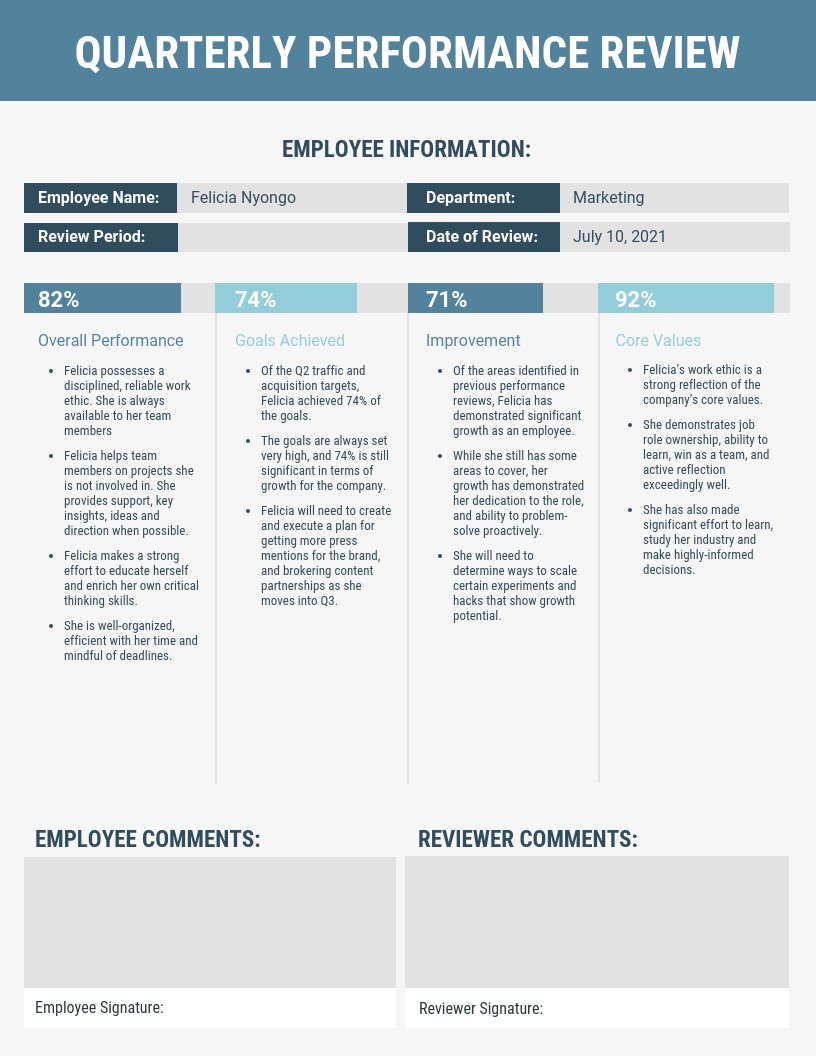












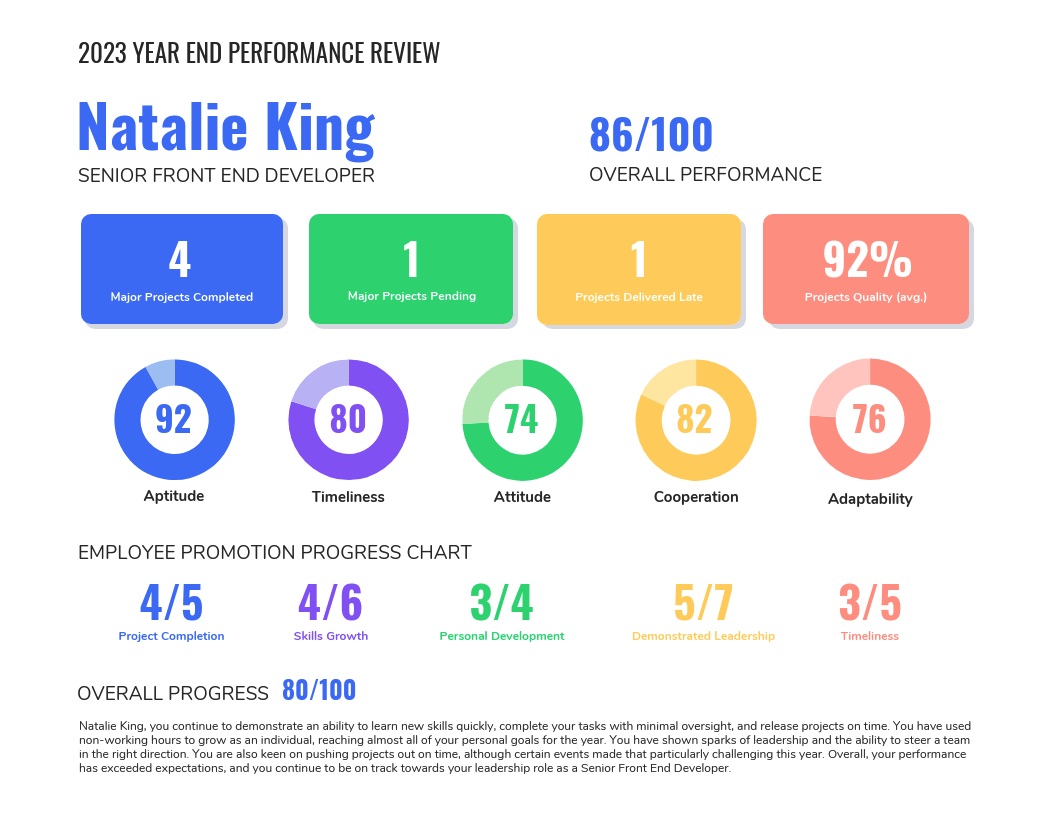
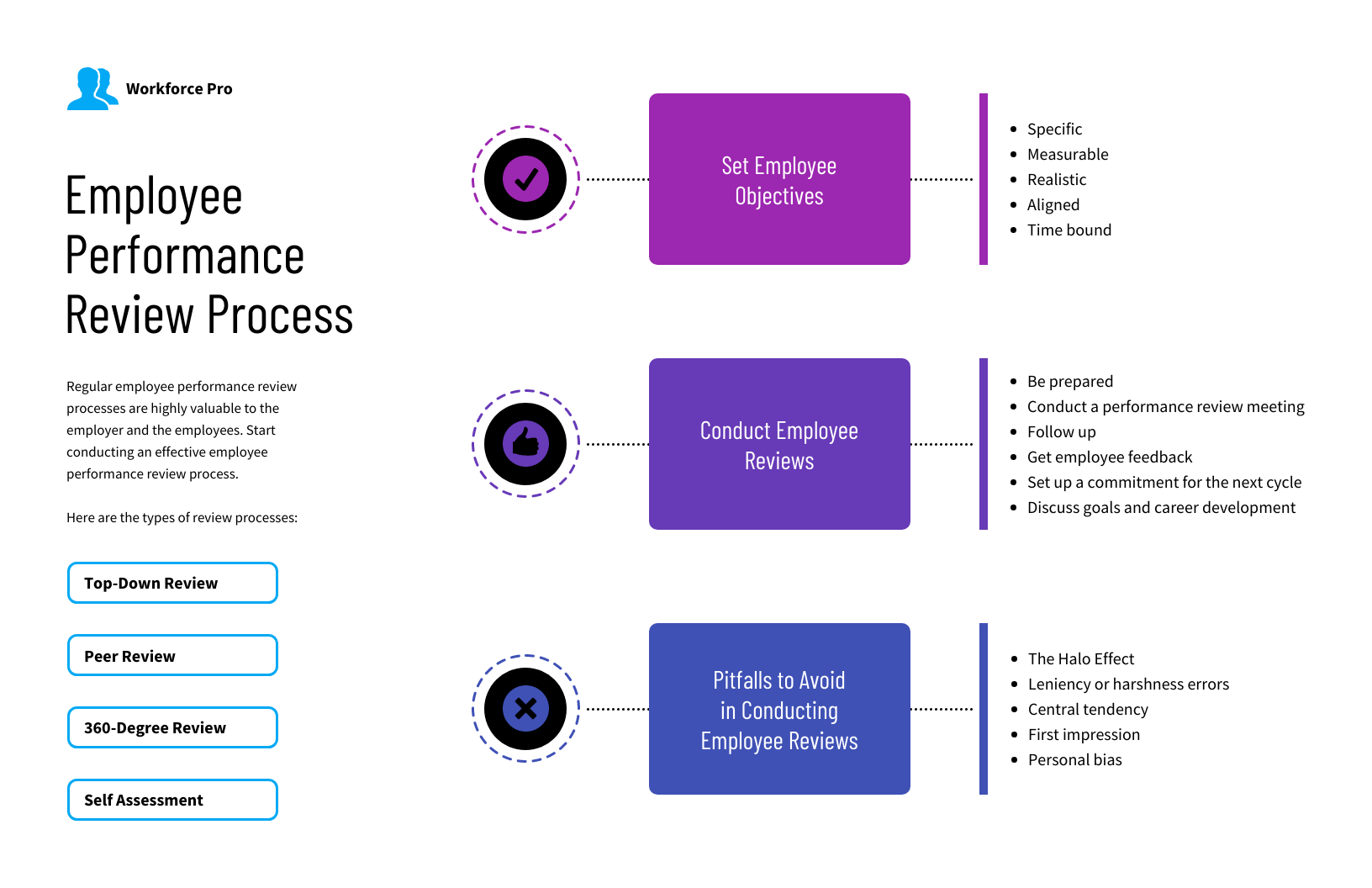


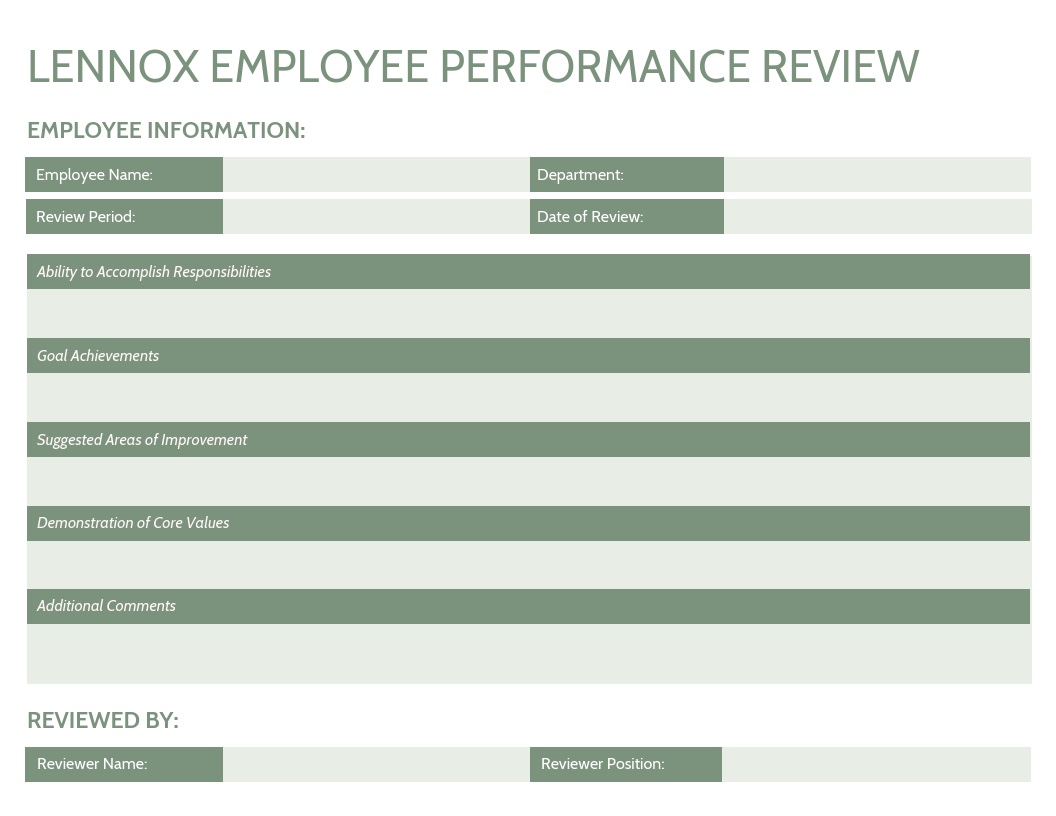





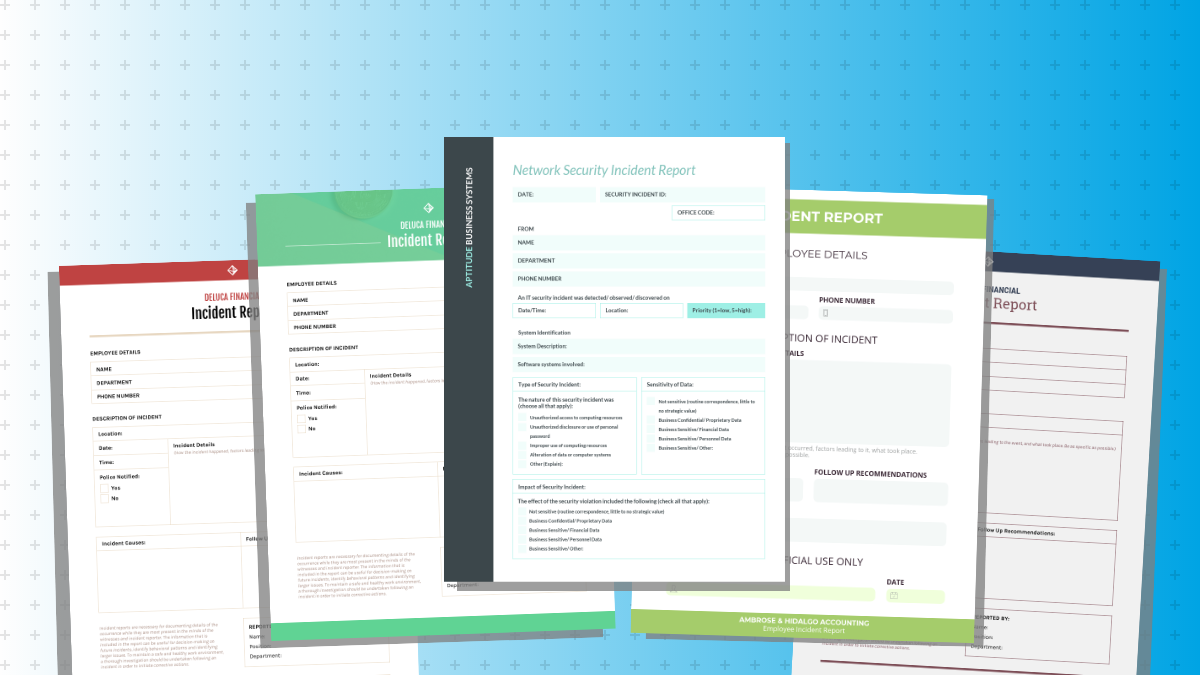


![6 Steps to Create a Strategic HR Plan [With Templates] 6 Steps to Create a Strategic HR Plan [With Templates]](https://venngage-wordpress.s3.amazonaws.com/uploads/2022/08/3e611956-2d22-469e-bbea-a3d041d7d385-1-1-1.png)




